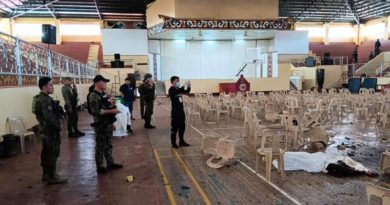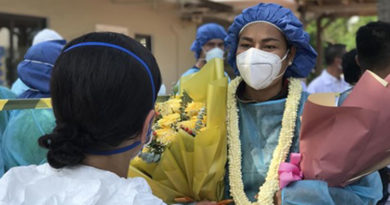Early diagnosis crucial in treating liver disease
Dr Taufique Ahmed in an interview at JPMC. – AZARAIMY HH
.
EARLY diagnosis is crucial in treating liver disease, said Dr Taufique Ahmed, a consultant in Gastroenterology and Hepatology, who is based in Singapore, but spends three days a week in Brunei, at the Jerudong Park Medical Centre (JPMC).
He is the Clinical Lead for Hepatology at Khoo Teck Puat Hospital, and also a visiting consultant at the Singapore General Hospital.
“The problem with liver disease is that once a person has the symptoms, it is already too late to avoid it,” said Dr Taufique, in a recent interview with the Bulletin. “Among the common symptoms are vomiting blood, jaundice and abdominal swelling, and by then, there is not much we can do. By then, you would need to undergo a liver transplant.
“The only way of diagnosing the condition is through a blood test. There are no symptoms in the early stages, so with early diagnosis, you can act on it and prevent it from developing into an advanced stage of liver disease.
“From liver disease, you can get kidney and heart problems as well,” he added.
A British citizen, who is married to a Bruneian radiologist whom he met while studying together in London, Dr Taufique’s presence at JPMC is expected to further enhance its specialised healthcare services.
Asked about the outlook for liver diseases in Brunei, he said, “There are plenty of fatty liver cases here, and thus an increase in the need for liver transplants which may need to be done overseas, but with the post-transplant services done here in Brunei.
>
“The most common form of liver disease is fatty liver disease among people who are a bit overweight, diabetic, hypertensive and with high cholesterol. The other common form is Hepatitis B, with 5.5 per cent of the population in Singapore suffering from it. Then there is also Hepatitis C, which people can get from intravenous drug use, for instance,” he said.
Dr Taufique also predicted an increase in liver transplants, partly due to a greater awareness of the procedure.
“I don’t think Brunei has sent many people for liver transplant overseas,” he said. “I am not sure, though through time, the numbers may increase. I think there is an increasing number of liver disease and cancer, which will benefit from liver transplants.”
Asked why liver transplants cannot be performed in Brunei, Dr Taufique explained, “Brunei does not have the needed large volume of cases to establish the level of expertise for liver transplant in the country, so patients are sent overseas.
“The procedure would be performed in a place with plenty of liver cases. If you done one or two a year – or three or four – you would not acquire the expertise, and so the quality of your treatment will drop. You need have to have a larger volume of cases,” he added.
He also spoke of his excitement at joining “the already excellent gastroenterology team at the JPMC”, having started work there three weeks ago.
“JPMC is surrounded by the tranquillity of nature, offering an ideal ambience for healing and wellness to the whole family,” he said further, adding, “The JPMC ward, overlooking the expanse of an enchanting beach, provides a sense of serenity and privacy, along with the soothing cadence of the waves.”
Dr Taufique graduated from St George’s Hospital Medical School at the University of London and is a member of both the Royal College of Physicians at the Royal College of Surgeons of England, and a Fellow of the Academy of Medicine Singapore Chapter of Gastroenterologists.
He completed his specialist training in Singapore, and holds a sub-specialty fellowship at the Liver Unit of King’s College Hospital in the United Kingdom.
His areas of special interest are viral hepatitis, fatty liver and liver cancer.
He manages both common gastroenterology and hepatology problems, with one of the largest volume of cases in Singapore, seeing over 2,500 outpatients a year and performing more than 1,100 endoscopies per year.
Dr Taufique keeps his knowledge base up-to-date by being heavily involved in research. In addition to being a site primary investigator for more than 10 multi-centre multinational studies, he is also holds the post of Senior Clinical lecturer at the Yong Loo Lin School of Medicine Singapore, and a teaching position at the Lee Kong Chian School of Medicine.
“In Singapore, I work at the Khoo Teck Puat Hospital, where I manage most of the liver cancer cases,” he said.
Given Dr Taufique’s wealth of experience and expertise, local patients are now able to have access to medical services associated with top-notch Singaporean hospitals at JPMC.
Courtesy: Borneo Bulletin | October 2, 2017 | Azaraimy HH |
<>









